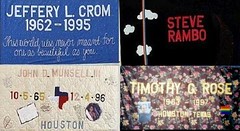One of the panels I was most eager to attend at Saints and Sinners was “Is AIDS still part of the plot?” Moderated by Thomas Keith, the panelists were Jameson Currier, Martin Hyatt, Robert Taylor, and Patricia Nell Warren. I was pleased to see a good turnout, and a lot of excellent points were made by those in attendance as well as by the panelists.
I’m still mulling over those discussions. AIDS was the biggest reality of my life from 1990 to 1997, at which point, like many people (most of whom endured a hell of a lot more than I did), I had to back away. Exhaustion, grief, rage, caregiving, activism, despair–all took a toll on those who survived the massive losses of the 1980s and first half of the 1990s. Two major changes required new approaches to the epidemic–the affected population and the appearance of protease inhibitors, and those new approaches needed people with fresh energy and commitment.
I would still donate a voice–I’ve never stopped advocating on behalf of those with HIV/AIDS–and I would still donate money, but it was necessary for me to take some time to grieve for my own personal losses. I knew many people who died, but four of them were among my dearest friends. Although those four had encouraged me never to shut up about the things I’d seen and the things they and their friends and lovers went through, they also wanted what anyone wants for those they love–that I be happy.
When the last of the four was gone, I was left wondering if I’d ever laugh again the same way. Feel joy. Hope. Optimism. If I’d ever know friendships again with that kind of intensity and loyalty and depth.
Of course, I have. Along with those who supported me during the hard times, I met friends who were willing and uniquely able to help lift the baggage I came with. Oh, even more. Friends who were willing to let me open those bags and show what was inside over and over, as often as I needed to, until finally it wasn’t baggage at all. It was part of my history and part of what kept four men I loved from being only names on Quilt panels.
I think it’s vital that people write their AIDS realities into fiction. I often read blogs of people who survived those first fifteen years; they are riveting. And their stories still provoke discussion and arguments. Those are the stories wherein AIDS is often the entire picture.
From the last ten-plus years, we also need stories wherein AIDS is, as Patricia Nell Warren said, “part of the mosaic.” Not the whole story, but part of the story. The storytellers need to come from all of the affected populations and speak to all of the affected populations.
Writers of gay fiction faced a challenge in that readers were tired, so tired, of tragedy and heartbreak. Just as my friends hoped for me, people wanted to laugh again. To feel joy. To read about love that wasn’t doomed and sex that wasn’t fatal.
Although in the six novels I’ve helped write, we’ve lost an important character because of AIDS and referred to the deaths of several others, I, personally, have never been able to fictionalize what happened to me between 1990 and 1997. I think there’s one circumstance in IT HAD TO BE YOU and one line in HE’S THE ONE that came directly out of my experience. Beyond that, the most I have consciously done is make safer sex and HIV/AIDS part of the awareness of the characters I write.
The way that I do honor my friends, the living and the dead, and all the friendships that were written about and so profoundly affected me from that first AIDS fiction, is to write about people who are fiercely loyal to one another. Who are there for each other across many years. Who transform their breakups and their rivalries and their misunderstandings into forgiveness, support, and friendship. Who still believe in love and hopeful endings. Those are the qualities of the friends I knew and lost. They are the qualities of the friends I still have.
If it’s an organic part of what we, or I, write, I hope that HIV/AIDS will always be some part of our novels. I only want to make sure that it’s written authentically.
If I’d gotten nothing else out of Saints and Sinners (and I got more than I ever imagined I would), the thoughts this panel provoked about my writing made it worth it.

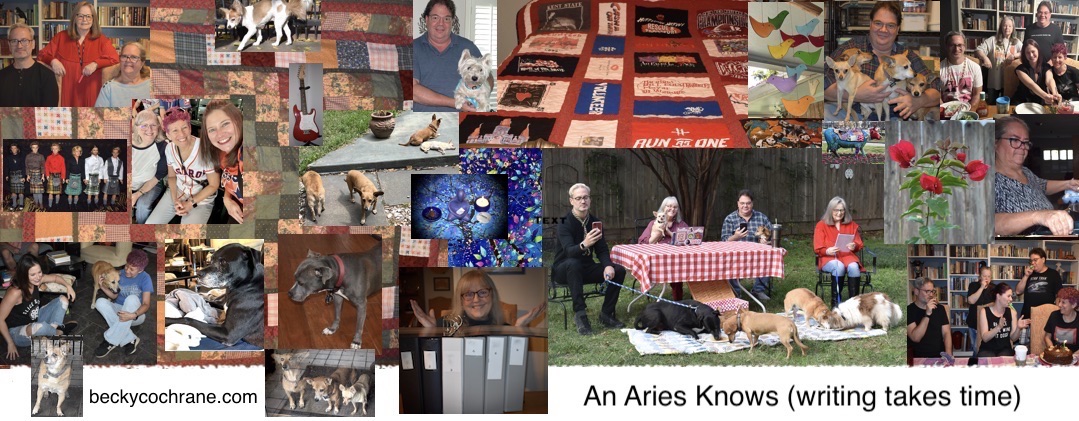


 Steve. Died 1992.
Steve. Died 1992.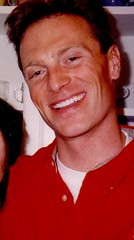 Jeff. Died 1995.
Jeff. Died 1995.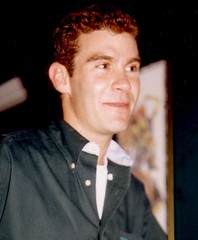 John. Died 1996.
John. Died 1996.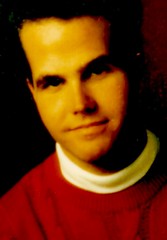 Tim. Died 1997.
Tim. Died 1997.